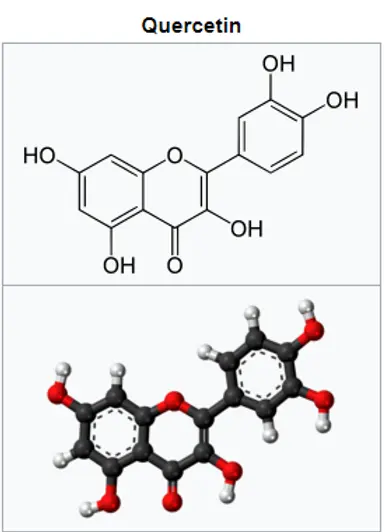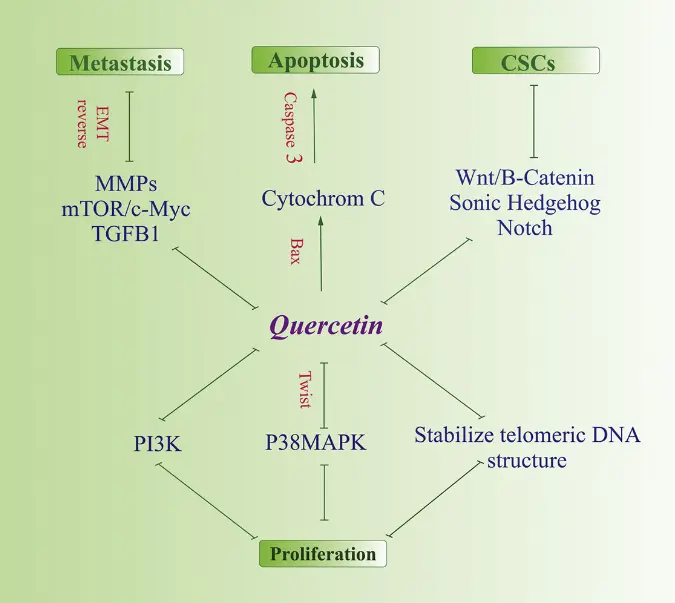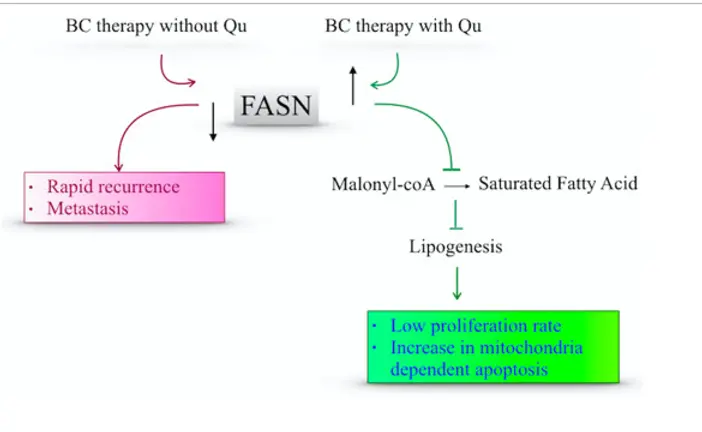Quercetin and its Role in Cancer
- Impact Tech Solutions
- Jul 15, 2024
- 6 min read
Cancer
The abnormal growth of cells anywhere in the body that can spread to the neighboring tissues is called cancer.
It is a dangerous disorder and can be of many types, based on the location in the body where uncontrolled cellular division takes place.
Cancer can be benign that does not spread to neighboring body parts but in most cases, cancers are metastatic, can spread to other body parts, and can even lead to the death of the patient.
Normally, the cells in the body are in a balanced state of cell division and cell death. But in cancer, this balance is lost and the cells that should die normally keep dividing and metastasizing.
So, cancer is a very serious disorder affecting millions of people every year throughout the world.
Many treatments are available for the disease and scientists are also paving the way for new treatments.
Hallmarks of Cancer Cells
The characteristics of cancer cells that differentiate them from normal body cells are called hallmarks of malignant cells.
There are many characteristics that can differentiate malignant cells from normal cells, some of these are:
Normal cells only grow and divide in the presence of specific external and internal signals, but cancer cells can grow in the absence of these signals.
Normal cells die by apoptosis at some specific time, but the cancer cells do not undergo apoptosis as they have altered mechanisms that protect them from cell death.
Cancer cells have the capability to move from the tissue they originated to another body tissue.
They have their own blood vessel system that can provide them with food for their long-term survival and also removes waste materials from these cells.
They can protect them from the immune system response.
Development of Cancer
The cancer cells develop by the uncontrolled division of cells at some specific area of the body. This unlimited cellular proliferation may be the result of the:
Alterations during cell division.
Maybe genetic and inherited from the parents in rare cases.
May occur due to exposure to some mutagens that can damage DNA and can lead to abnormal cellular processes resulting in cancer.
Genes that can lead to Cancer
Two groups of genes occur in cells that can cause cancer when mutated. These genes are:
Tumor suppressor genes
They normally control the division of cells in the body to prevent cancer. But if some mutation occurs in these genes, they cannot perform their function, and hence, cells divide uncontrollably.
Oncogenes
These are actually cancer-causing genes. These are found in normal cells as proto-oncogenes and are in inactive form. But if some alteration converts them to an oncogene, that is the active form of the gene, they make the cells attain cancerous phenotype .

Common types of cancer
The most common types of cancer worldwide that affect a large number of people every year are:
Breast
Lung
Bronchus
Prostate
Colon
Rectum
Skin
Bladder
Kidney
Quercetin
One of the six subclasses of flavonoid chemicals, quercetin is classified as a flavanol.
Naturally, it is an auxin transport inhibitor.
The most prevalent flavonoid molecules are quercetin-type flavanols, which are found in plants as quercetin glycosides.
They are present in many parts of the plant as well as in many fruits and vegetables.
Purobest Quercetin Brom Lipomax 1000 contains the highest amount of quercetin with 95% pure quercetin dihydrate from Saphora Japonica more than any other product in the market.

Significance of Quercetin
Quercetin can benefit many bad health conditions.
It has been proven through clinical experimentation to be very safe and effective against the following health conditions:
Cardiovascular diseases
Cancer
Inflammatory disorders
Allergies
Arthritis
Bladder infections
Skin diseases
Diabetes
Blood pressure
Liver disorders
Dementia
The effectiveness and safety of quercetin against all these disorders have been proved through scientific experiments.
Mechanisms of action of Quercetin
Quercetin owes its possible antioxidant properties to the phenolic hydroxyl group and the existence of a double bond. Cancer and cardiovascular illnesses can be prevented and treated because of quercetin's antioxidant qualities.
Inflammation is triggered by free radicals in the body; however, antioxidants help scavenge and neutralize free radicals. So, it stands to reason that quercetin, an antioxidant flavonoid, would also have anti-inflammatory characteristics.
Multiple studies have shown that daily quercetin supplementation lowers levels of c-reactive protein, an inflammatory biomarker that is increased in illnesses including heart disease, rheumatoid arthritis, metabolic syndrome, and diabetes.
The antioxidant quercetin has shown anti-cancer capabilities, which is one of the reasons eating a lot of bright fruits and vegetables is so incredibly healthy. Yet, it has been demonstrated that quercetin prevents the development and multiplication of cancer cells.
Several laboratory and animal studies show quercetin's capacity to slow down the development of cancer cells and even trigger cancer cell death in a variety of cancer types (breast, colon, ovarian, lung, and prostate).
The cardiovascular advantages of quercetin go beyond its anti-inflammatory properties. It decreases high cholesterol, reduces blood pressure, and raises HDL levels. It protects our hearts in many different ways .
Quercetin and Cancer
Many experimental studies have confirmed that Quercetin can be very effective against almost all types of cancers.
Different in vivo, in vitro, and human clinical trial studies have been performed that have confirmed that this flavonoid can be used to treat cancer patients.
Cancer is a complex disorder with many treatments available in the market, but yet, there is a need for more treatments for patients considering the rise in the number of affected persons every day.
Scientists are mostly focusing on herbal or organic treatments nowadays for the treatment of disorders to prevent side effects. But these remedies should have been approved scientifically through human clinical trials before commercialization.
Quercetin has proven itself to be the best remedy for different cancer types by killing cancer cells via different mechanisms of action.
Experimental studies and Mechanisms of Action in Cancer
Many in vitro and in vivo studies have been performed to check the safety and efficacy of quercetin against cancer.
For different types of cancers, experiments have been performed on human cell lines and animal models in the laboratory to study the mechanisms of action of quercetin in treating cancers.
Quercetin has been found to have multiple targets within the cancer cells in order to kill these malignant cells.
It can interact with different types of cell surface receptors that are involved in cancer causation e.g., 67LR. It changes the expression of these receptors in cells so that they can not bind to their ligands anymore and hence cancer cells cannot survive.
Quercetin can also change the signal transduction pathways in malignant cells by altering the expressions of some specific proteins that are part of these pathways helping cancer cells in their survival and proliferation, such as ERK, MAPK, RAF, and MEK .
It can also induce apoptosis in the cancer cells by increasing the expression of pro-apoptotic proteins via interaction with them. This mechanism helps kill cancer cells by programmed cell death.
It can also arrest the cell cycle by interacting with different cell cycle proteins in order to stop the proliferation of malignant cells and reduce tumor size in patients.
Quercetin also has a role in preventing the metastasis of cancer cells to neighboring tissues. It can also prevent the angiogenesis of these cells to make their survival difficult.

Human Clinical Trials
After analyzing the safety and efficacy of quercetin against cancer on human cell lines and animal models, it is also tested on humans in order to approve for marketing purposes.
Any medicine to be commercialized should be tested on humans and get passed in these clinical trials. If it does so, then it should be commercialized.
Quercetin has proven itself safer in the clinical trials performed on different types of cancer patients in different studies.
Role of Quercetin in Breast Cancer
A phase 1 clinical trial has been performed on human breast cancer patients to check the effectiveness of Quercetin against this type of cancer.
Patients of different ages were part of this study.
The patients were divided into two groups, one group was treated with quercetin, which may be given as a nutraceutical, while the other group was not given this flavonoid.
After a specific time period, the disease conditions of both group patients were compared.
It was confirmed through this study that quercetin has anti-inflammatory activity and can help in tumor size reduction.
Different mechanisms of quercetin were already confirmed through laboratory experiments in killing of cancer cells.


Role of Quercetin in Colon Cancer
A clinical trial was performed in 2006 on human colon cancer patients to check the effectiveness of quercetin in these individuals.
Quercetin was given orally to these cancer patients for around 6 to 10 weeks. And they were given 3 doses of the compound per day.
The results of this trial confirmed that quercetin can be very effective in preventing colon cancer as it can kill the colon cancer cells by multiple mechanisms as discussed above [9].
Role of Quercetin in Pancreatic Cancer
Another study was performed on human pancreatic cancer patients in 2015.
These patients were given a dose of 90 mg of quercetin per day for about one year.
A great reduction in tumor size was observed in these patients after the treatment.
Quercetin reduced the tumor size and stopped their growth by different mechanisms in pancreatic malignant cells [10].
Role of Quercetin in Follicular Lymphoma
A clinical trial study was performed in 2009 on human follicular lymphoma patients.
These patients were given quercetin mixed in grape juice orally.
A high dose of quercetin was given to the patients for about four months.
The results confirmed that quercetin can induce apoptosis in the follicular lymphoma cancer cells and can kill these cells thus reducing the size of the tumor in the patients.
Moreover, these trials confirmed the safety of quercetin in humans




Comments